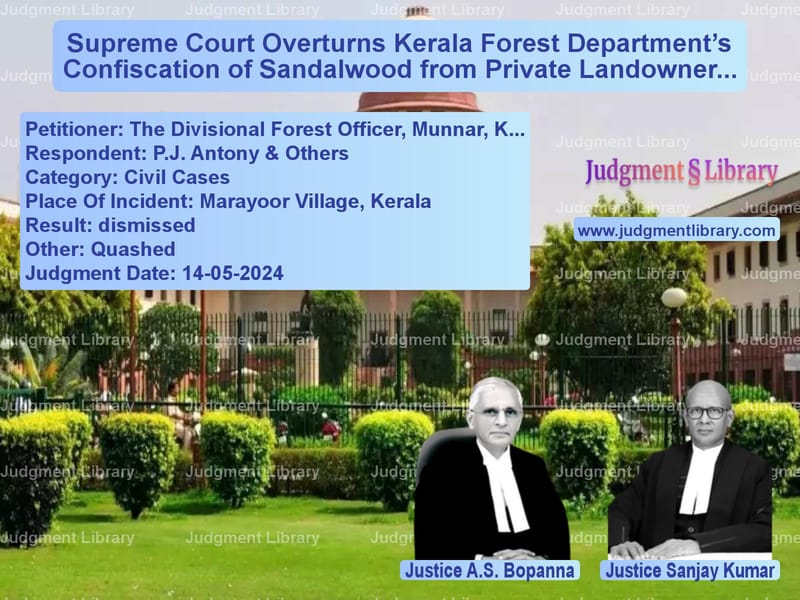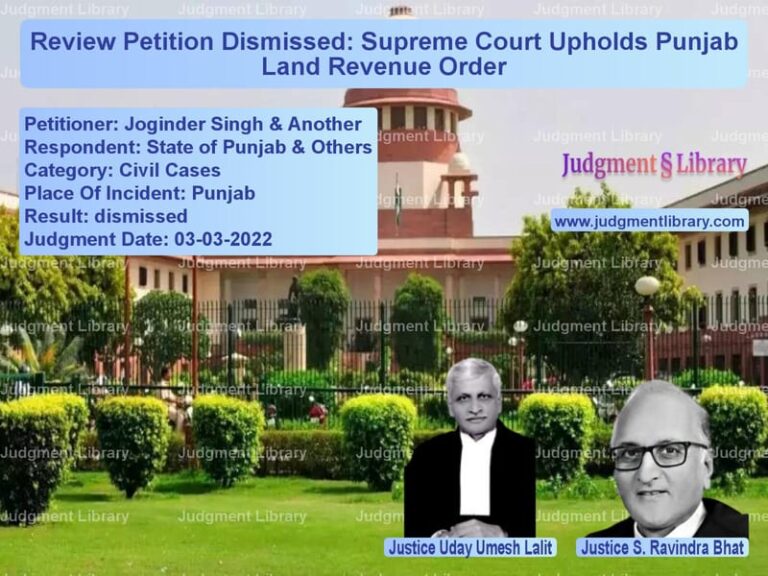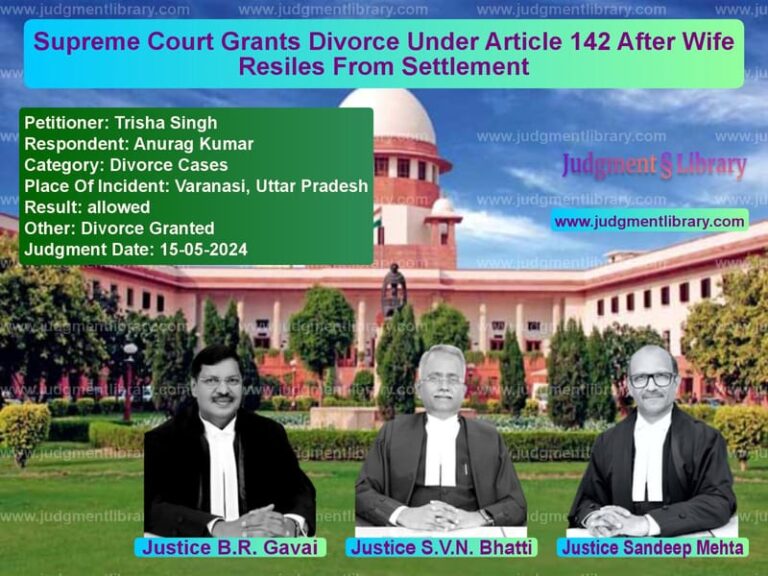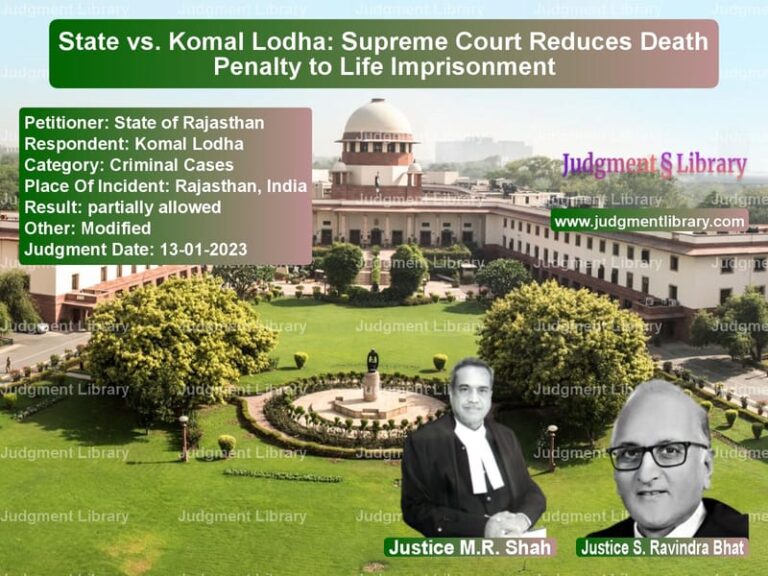Supreme Court Overturns Kerala Forest Department’s Confiscation of Sandalwood from Private Landowners
The case of The Divisional Forest Officer, Munnar, Kerala vs. P.J. Antony & Others revolves around the confiscation of sandalwood trees from private landowners by the Kerala Forest Department. The Supreme Court, in its judgment dated May 14, 2024, ruled in favor of the landowners, setting aside the confiscation orders and directing the government to proceed under its established scheme for handling sandalwood grown on private lands.
Background of the Case
The dispute arose when the Kerala Forest Department confiscated sandalwood trees from the lands of P.J. Antony and Cheriyan Kuruvila in Marayoor Village, Kerala. Both landowners had applied to the local revenue authorities for permission to hand over naturally fallen and dried sandalwood trees to the Forest Department under the existing government scheme.
The Kerala government’s order dated April 3, 1973, allowed private landowners to auction sandalwood trees grown on their land, with 70% of the proceeds going to them and 30% retained by the Forest Department.
Following an inspection in January 2001, the revenue officers confirmed the presence of dried and fallen sandalwood trees on their lands. However, before any official action could be taken, the Forest Department, acting on alleged “secret information,” seized the sandalwood in July 2001, claiming it was illegally removed.
Legal Proceedings
The confiscation was confirmed by the Divisional Forest Officer, Munnar, in an order dated February 23, 2004. The landowners challenged this decision before the District Judge, Thodupuzha, who upheld the confiscation.
Aggrieved by this, the landowners filed writ petitions before the Kerala High Court, which set aside the confiscation orders, ruling that there was no evidence of a forest offense. The High Court directed the Forest Department to process their applications under the 1973 government scheme.
The Kerala Forest Department then appealed to the Supreme Court.
Arguments by the Petitioner (Kerala Forest Department)
The Forest Department argued:
- The landowners had illegally uprooted and stacked the sandalwood without authorization.
- The movement of the trees violated the Kerala Forest Produce Transit Rules, 1975, making it a “forest offense.”
- The department had a legal presumption under Section 69 of the Kerala Forest Act, 1961, that the sandalwood belonged to the government.
- The case should be treated as an illegal removal of forest produce rather than a legitimate handover of trees.
Arguments by the Respondents (Landowners)
The landowners countered:
- The sandalwood trees had naturally dried and fallen on their land, as confirmed by revenue officers.
- Their applications to transfer the trees to the Forest Department had been ignored.
- The seizure was arbitrary, and the Forest Department had acted in bad faith.
- There was no proof that the trees were illegally removed from forest land.
Supreme Court’s Observations
The Supreme Court ruled that the confiscation was unjustified and the Forest Department had overstepped its authority. The Court noted:
“There is no evidence of a ‘forest offense’ as defined under the Kerala Forest Act. The movement of trees within private land does not constitute a violation.”
The Court further observed:
- The landowners had followed the proper legal procedure by applying to transfer the trees.
- The revenue officers’ reports confirmed the presence of the trees, making the Forest Department’s claims baseless.
- The presumption under Section 69 of the Kerala Forest Act did not apply since the landowners had valid title to the land.
Key Findings and Judgment
The Supreme Court held that:
- The confiscation orders dated February 23, 2004, and the District Judge’s ruling in CMA No. 39 of 2004 were set aside.
- The Forest Department must process the landowners’ applications under the 1973 scheme.
- The entire process should be completed within three months of the judgment.
The Court concluded:
“The learned Judge of the Kerala High Court was fully justified in setting aside the confiscation order. The Forest Department shall proceed in accordance with the government’s scheme.”
Implications of the Judgment
The ruling has several implications:
- Legal protections for landowners: The judgment affirms that private landowners have rights over naturally grown trees.
- Limitations on forest authorities: The case clarifies that forest officials cannot confiscate property without clear proof of a forest offense.
- Enforcement of due process: The ruling reinforces the need for government agencies to follow legal procedures before taking punitive actions.
Conclusion
The Supreme Court’s decision in The Divisional Forest Officer, Munnar, Kerala vs. P.J. Antony & Others reinforces the importance of protecting private landowners’ rights while ensuring that government agencies operate within the bounds of the law. By ruling against the arbitrary confiscation of sandalwood, the Court has set a precedent for similar disputes, ensuring that due process is followed in all cases involving natural resources.
Read also: https://judgmentlibrary.com/supreme-court-orders-restitution-in-landmark-land-auction-dispute/
Petitioner Name: The Divisional Forest Officer, Munnar, Kerala, and another.Respondent Name: P.J. Antony & Others.Judgment By: Justice A.S. Bopanna, Justice Sanjay Kumar.Place Of Incident: Marayoor Village, Kerala.Judgment Date: 14-05-2024.
Don’t miss out on the full details! Download the complete judgment in PDF format below and gain valuable insights instantly!
Download Judgment: the-divisional-fores-vs-p.j.-antony-&-others-supreme-court-of-india-judgment-dated-14-05-2024.pdf
Directly Download Judgment: Directly download this Judgment
See all petitions in Property Disputes
See all petitions in Landlord-Tenant Disputes
See all petitions in Specific Performance
See all petitions in Damages and Compensation
See all petitions in Judgment by A. S. Bopanna
See all petitions in Judgment by Sanjay Kumar
See all petitions in dismissed
See all petitions in Quashed
See all petitions in supreme court of India judgments May 2024
See all petitions in 2024 judgments
See all posts in Civil Cases Category
See all allowed petitions in Civil Cases Category
See all Dismissed petitions in Civil Cases Category
See all partially allowed petitions in Civil Cases Category






